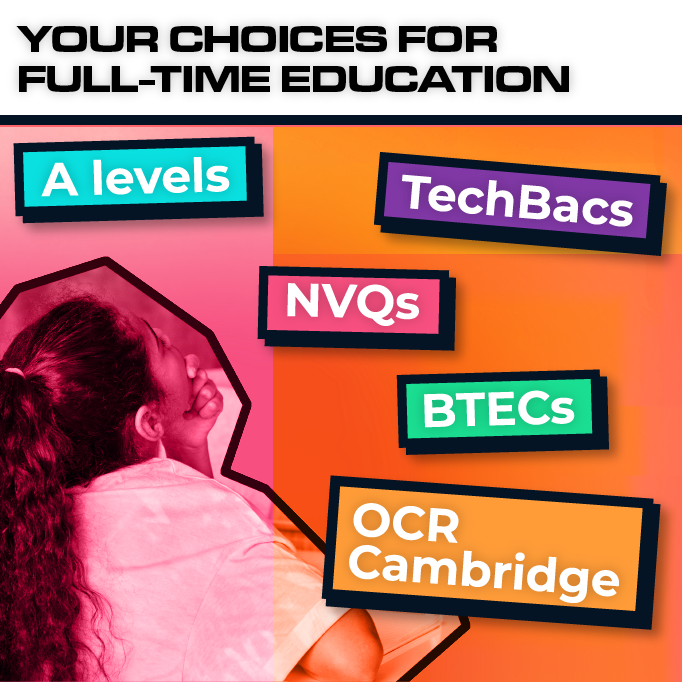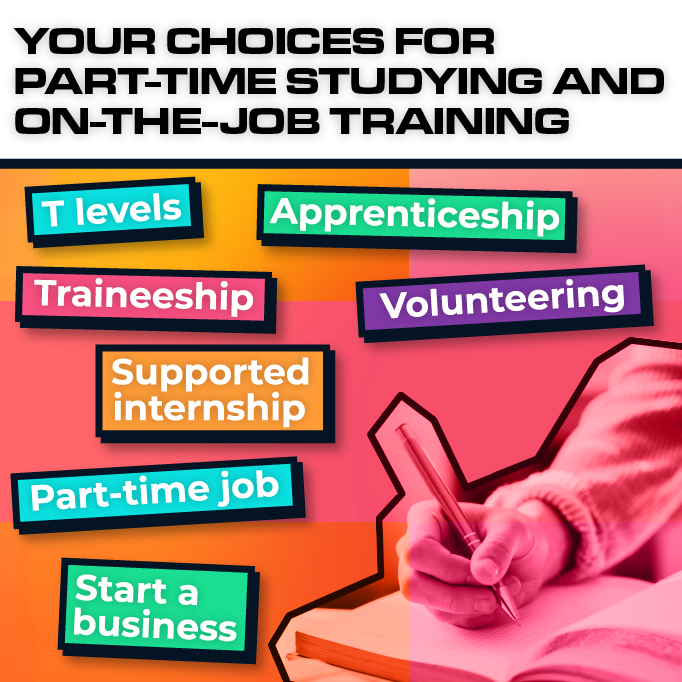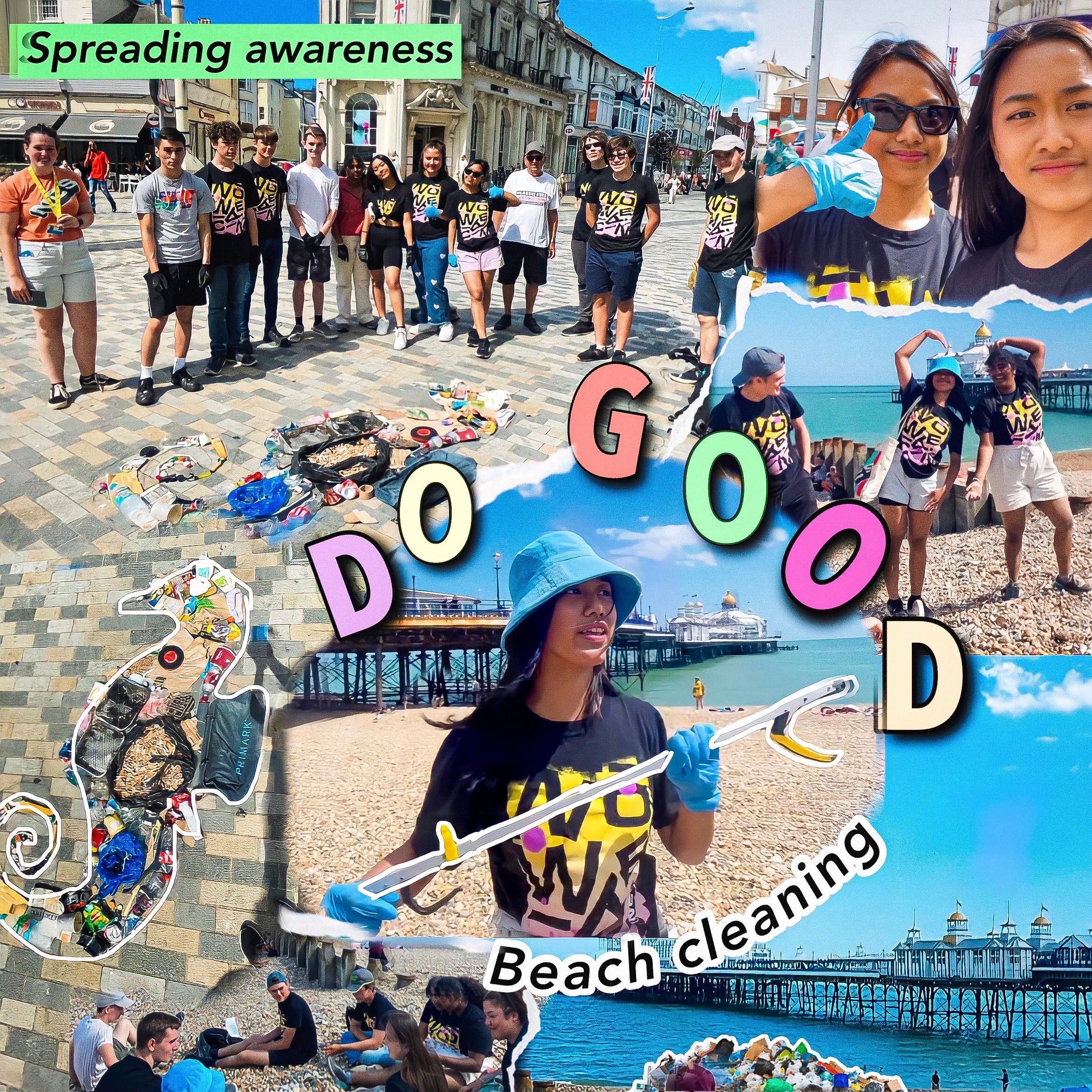
What are my options after GCSEs?
If you’re thinking about what to do after your GCSEs, you could choose to continue studying full-time, get a part-time job, or start an apprenticeship or training. We know that thinking about the future can be daunting, so once you get your GCSE results you might want to take a moment to assess before making any final decision. Just remember, there isn't one set path for everyone, and there are so many different routes available for you!
4 min read
Finding the right option for you
You do legally need to continue in education or training until you’re 18. That means that while you can’t go out and get a full-time job right now, you can choose from all sorts of different types of studying, training, and part-time work.

After your GCSEs: Full-time education
If you’re raring to get back to studying after finishing your GCSEs, then there are a couple of options to consider.
A levels. Lots of people choose to do A levels, especially if they’re planning on going to university. A levels are a Level 3 qualification that take two years to complete. You can choose to study the subjects you most enjoy, and, if you already have a career in mind, you’ll want to choose ones that’ll help you get a job in that industry. For example, if you want to work in medicine, then you’ll need to study subjects like biology, chemistry and either maths or physics.
Vocational qualifications. These include BTECs, NVQs, TechBacs and OCR Cambridge. Just like A levels, these are Level 3 qualifications and can be used to further your education or career. The difference to A levels is that they offer a combination of hands-on practical learning with studying and technical skills. Also, whereas A levels are exam-based, vocational qualifications have ongoing assessments, which lots of people prefer. You can also use these qualifications to go into further education, training, employment or university.
After your GCSEs: Part-time studying and on-the-job training
While you need to be 18 before you can start full-time work, once you’ve finished your GCSEs you can do part-time work and on-the-job training and learning.

T levels. These two-year courses, which are available at selected colleges and other providers, are equivalent to taking three A Levels. You’ll do practical and knowledge-based learning at a school or college, alongside getting on-the-job experience from spending around 315 hours doing an industry placement. Find out more about T levels over here.
Traineeship. A traineeship let’s you develop your skills by doing a work placement at an organisation, and it usually lasts between eight weeks and six months. Each traineeship is designed to help you move into an apprenticeship or employment, and it gives you a taste of the working world plus a good chunk of career advice, guidance, and you’ll learn on the job! Loads of traineeships can be found over here. Although they are usually unpaid, there is the option to apply for support from the 16 to 19 Bursary Fund from the government.
Apprenticeship. An apprenticeship is a paid position within an organisation or company, and it usually lasts between one and three years. During an apprenticeship you’ll be able to work towards a qualification while also learning on the job and gaining the knowledge and skills you need to progress into further education or build your career. From the beauty and construction industries to web technology and engineering, there are thousands of different apprenticeships out there. The UCAS website is just one place where you can search for paid apprenticeships based on your interests and location.
Supported Internship. If you have learning difficulties or a learning disability then a supported internship can help you move into the world of work. These internships are unpaid positions that last for at least six months, and they aim to give you training, support and work skills. Most of the learning is done in the workplace, and you’ll also have the opportunity to study for qualifications as part of a personalised study programme.
Volunteering. While volunteering isn’t paid work, you’ll gain valuable skills and it’ll look good on your CV. You can volunteer on a project or with a charity, and so long as you’re doing more than 20 hours of volunteering a week for more than eight weeks alongside your studying, then you can get an accreditation. The part-time learning/training has to be 280 guided learning hours a year, which works out as one day a week. You don’t have to do all your volunteering in one place either! You can spread the hours across however many volunteering opportunities as you like, but just make sure you keep note of it all. It’s a good idea to get a written agreement of your hours with the organisation you’re volunteering for.

Start a business. Maybe you’ve already got a side hustle going, or you’ve got a good idea for a business. If so, you can do it as more of a main hustle if you want! You’ll have to ensure you’re studying alongside it, but if you’re working more than 20 hours a week on your business (for more than eight weeks) then you’ll be able to get an accreditation.
No matter how your GCSEs go, remember that you’ve got a whole range of options ahead of you. Deciding which choice is right for you is just the first step to an exciting future!

